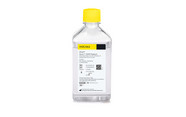Cancer and the Combination Approach
Oncology is a tricky sector in which to innovate, but we can start by optimizing existing combination approaches
Liz Henderson | | 3 min read | Discussion

Credit: Author supplied
Innovation is at the core of what we do in the pharmaceutical industry. The goals are clear: to develop new medicines that address important unmet needs – and then ensure we develop the necessary infrastructure so that they reach the patients who need them. To get there, we need novel approaches to solve challenges at every stage of the drug discovery and development process – from process design to end-to-end manufacturing and supply of the final medicine that is delivered to patients.
Our pursuit of innovation is particularly relevant in oncology because many cancers still have limited treatment options and poor survival outcomes (1). Moreover, many existing therapies can be difficult to tolerate, and there have also been shortages in recent years (2).
Developing new oncology treatments is a particularly challenging task because of the complexity of cancer (3). There is significant molecular heterogeneity between and within different cancer types and important differences between individual patients. Worse still, tumors can evolve and, when exposed to an effective treatment, can adapt to acquire resistance.
In recent decades, combination therapy has emerged as a mainstay of cancer treatment. As the name suggests, this treatment modality combines two or more cytotoxic agents with different mechanisms of action to enhance efficacy and reduce drug resistance. Although combination therapy has improved survival outcomes across different cancer types, several promising drug combinations have failed to deliver treatment benefits (4,5).
What does this tell us? As ever, a one-size-fits-all approach does not work when treating cancer. With conventional combination therapy, high doses are given of each drug but differences in the mode of delivery, pharmacokinetics, and drug interactions mean that different proportions of each drug reach the tumor site (5). This failure to deliver synergistic drug ratios at the target may result in poor efficacy and adverse effects.
Platforms continue to be developed that improve combination therapy through rational drug design that evaluates drug combinations to identify drug ratios that optimize anti-tumor activity at the preclinical stage. New formulation approaches also exist, such as nanoparticle-based delivery systems that can be paired with a drug combination to deliver the synergistic drug ratio to the tumor site (5). This approach has already been used in acute myeloid leukemia and could also be applied to other cancer types in the future (6).
Historically, innovation in the pharmaceutical industry has centered around the discovery of active pharmaceutical ingredients. A new, potentially life-saving treatment, however, can only make a difference if physicians can access a reliable supply.Drug shortages in oncology are not new. The global COVID-19 pandemic saw an increase in critical supply chain issues in the manufacture of drugs, which even further underscored the need for continued advancements in the manufacturing of oncology medicines.
Of course, daring to innovate is not easy. It requires expertise, time, and resources. The potential reward – improving the lives of patients – is great, but getting there involves overcoming many challenges. These include the risk of failure, regulatory hurdles, and competition, amongst others. As technologies for manufacturing medicines advance, early and frequent interaction with regulatory authorities is key.
- C Conway et al, “Research Strategies for Low-Survival Cancers”, Cancers; 13(3):528. (2021) doi:10.3390/cancers13030528
- S Turner, “Cancer treatment uncertainty: European nations struggle with drug shortages”, Pharmaceutical Technology (2023). Available at: https://www.pharmaceutical-technology.com/features/cancer-treatment-uncertainty-european-nations-struggle-with-drug-shortages/
- WS El-Deiry et al, “Tumor Evolution, Heterogeneity, and Therapy for Our Patients With Advanced Cancer: How Far Have We Come?”, American Society of Clinical Oncology Educational Book, (37):e8-e15. (2017) doi:10.1200/EDBK_175524
- RB Mokhtari et al, “Combination therapy in combating cancer”, Oncotarget, 8(23):38022-38043. (2017) doi:10.18632/oncotarget.16723
- Tolcher AW, Mayer AD, “Improving combination cancer therapy: the CombiPlex® development platform”, Future Medicine. (2023). Available at https://www.futuremedicine.com/doi/10.2217/fon-2017-0607
- Jazz Pharmaceuticals, “How Treatment Technology is Advancing the Discovery of Cancer Medicines”, Fierce Biotech (2020). Available at https://www.fiercebiotech.com/sponsored/how-treatment-technology-advancing-discovery-cancer-medicines
Liz Henderson was appointed senior vice president, Technical Operations, at Jazz Pharmaceuticals in August 2023. She has extensive experience in commercial leadership roles at the regional and global level in technical operations, global manufacturing and supply chain management. Throughout her career, she’s demonstrated a strong passion for helping patients across the world through advancements in technology.


















